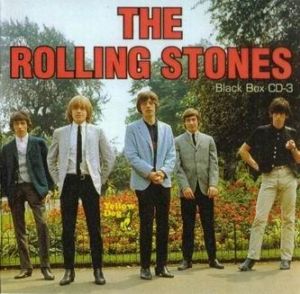
- Format: MP3

CD-3:
- Sympathy For the Devil: Compressed sound with "who..who's" way down in the mix. There are also a few bars edited from Keith's solo. Recorded at Olympic studios in June, 1968.
- Country Honk: Missing the fiddle track and the familiar car horn. A transitional song that reveals the influences of the time. Gram Parsons' turning Keith on to the soul of country music, and open tunings that were prevalent in the Country (Delta) Blues. Even the Rock version of the song reflects the impact of working with Ry Cooder during the "Let It Bleed" sessions, and Keith's enduring preference for Open G tuning that followed. His earlier efforts with open tunings were in open D & E on songs such as Child Of The Moon, Street Fighting Man (studio), and Prodigal Son.
- Gimme Shelter: A different mix and vocal. Lot's of bass in the opening bars of the song. Minus the Merry Clayton vocal. Recorded at Olympic Studios in May-June, 1969.
- Loving Cup: This could be the pre-Hyde Park studio version of the song. First surfaced on "Time Trip 1969-1973 Vol. 1" on Scorpio. Possibly from a May-June session at Olympic in 1969.
- Jiving Sister Fanny: Muffled sound with a different vocal take. Taylor burns it up.
- Honky Tonk Women: A studio version of the song containing the Paris verse that was only heard on early 70's live versions of the song. Also missing horn arrangements. Recorded at Olympic Studios in May-June, 1969.
- All Down The Line (Acoustic): One of the great examples of how the band can evolve songs. Slow acoustic guitar version. First surfaced in the late 70's, but this has excellent clarity and corrected speed. Recorded at Elektra studios in LA, Oct., 1969.
- All Down The Line (Electric): This is not the 7" single version of the song that usually shows-up on these recordings. Different mix, and harp solo at 3:05. An Olympic Oct.-Nov., 1970 recording.
- I Don't Know The Reason Why: Not hard to guess why this hasn't been released. A shorter version of the song.
- I'm Going Down: Last of the "Metamorphosis" songs. It's the familiar guitar restart album version. Hard to say whether this is a production error or a retake by Keith.
- You Gotta Move: An alternate take of the Mississippi Fred McDowell classic. There is a lot of vocal reverb at the beginning, and the slide guitar goes into a "wah" effect at the end. A Muscle Shoals, Dec., 1969 recording. Part of the work at this studio is documented in the "Gimme Shelter" movie. Fred's original version of "You Got To Move" is found on "Fred McDowell Vol. 2" on Arhoolie Records. Order no. F 1027.
- Brown Sugar: The earliest known version. Some of the fundamental tracks are inherited by later takes. Muscle Shoals, Dec., 1969.
- Brown Sugar: Starts-stops-restarts-stops-restarts. Sloppy production by the manufacturer of a take that is very similar to the album.
- Bitch: This is the album version of the song that starts off with some subtle cymbal tapping just before the start, and completely wipes out at 2:18 when the tape fouls-up.
- Good Time Women: The well known first version of Tumbling Dice. An Olympic, Oct., 1970 recording.
- Sway: The 7" single version. A different mix and take.
- C.S. Blues: The infamous let's make the last song we owe Decca a real good one! Recorded at Olympic in May, 1970. The origins and inspiration are explained by Marshall Chess in the opening 10 minutes of the movie with the same title. Interestingly, the song was rehearsed at the Woodstock rehearsals in preparation of the 1978 US Tour. Was Jagger reminded of this song by a copy of an unauthorized recording purchased while in New York? He commented on unauthorized recordings at some length in an interview from the early 70's.
Hardcore addicts may revel in this collection, but the average Stones fan would do well to stick to legitimate releases. Curiosities include an obscene studio schtick with Gene Pitney, and a heap of early obscurities (e.g. "We're Wastin' Time," "Sleepy City," "Some Things Just Stick in Your Mind") which blur indistinctly into one big mess o' blues. Instrumental backing tracks from Aftermath, Flowers and Between the Buttons are included — most of which are surprisingly listenable. A Jagger-less "Satisfaction" riffs on ad nauseum, but diamond-in-the-rough alternates of "Gimme Shelter" and "Brown Sugar" are worthwhile. In short, the Black Box is a dissertation on Mick and Keef; well-researched musically, but not for the faint-hearted.